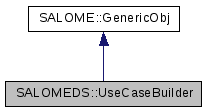Interface of the UseCaseBuilder. More...
import "SALOMEDS.idl";

Public Member Functions | |
| boolean | Append (in SObject theObject) |
| Adds to the use case an object as a child of the current object of the use case. More... | |
| boolean | Remove (in SObject theObject) |
| Removes an object from the use case. More... | |
| boolean | AppendTo (in SObject theFather, in SObject theObject) |
| Adds a child object theObject to the given father theFather object in the use case. More... | |
| boolean | InsertBefore (in SObject theFirst, in SObject theNext) |
| Inserts in the use case the object theFirst before the object theNext. More... | |
| boolean | SetCurrentObject (in SObject theObject) |
| Sets the current object of the use case. More... | |
| boolean | SetRootCurrent () |
| Makes the root object to be the current object of the use case. More... | |
| boolean | HasChildren (in SObject theObject) |
| Returns True if the given object theObject of the use case has child objects. More... | |
| boolean | SortChildren (in SObject theObject, in boolean theAscendingOrder) |
| Returns True if children of the given object theObject of the use case tree were sorted successfully. More... | |
| SObject | GetFather (in SObject theObject) |
| Gets father object of the given object theObject in the use cases tree. More... | |
| boolean | SetName (in string theName) |
| Sets the name of the use case. More... | |
| string | GetName () |
| Gets the name of the use case. More... | |
| boolean | IsUseCase (in SObject theObject) |
| Returns True if the given object theObject represents a use case. More... | |
| boolean | IsUseCaseNode (in SObject theObject) |
| Returns True if the given object theObject is included in the use cases tree on any level. More... | |
| SObject | GetCurrentObject () |
| Gets the current object of the use case. More... | |
| SObject | AddUseCase (in string theName) |
| Creates a new use case in the use case browser. More... | |
| UseCaseIterator | GetUseCaseIterator (in SObject theObject) |
| Returns the UseCaseIterator for the given object theObject in the use case. More... | |
| void | Register () |
| Increase the reference count (mark as used by another object). More... | |
| void | UnRegister () |
| Decrease the reference count (release by another object). More... | |
| void | Destroy () |
| Obsolete, left for compatibility reasons only. More... | |
Detailed Description
Interface of the UseCaseBuilder.
Use case in the study represents a user-managed subtree, containing all or some of the objects which exist in the study. The UseCaseBuilder interface contains a set of methods used for management of the use case in the study.
Member Function Documentation
| SObject SALOMEDS::UseCaseBuilder::AddUseCase | ( | in string | theName | ) |
Creates a new use case in the use case browser.
| boolean SALOMEDS::UseCaseBuilder::Append | ( | in SObject | theObject | ) |
Adds to the use case an object as a child of the current object of the use case.
- Parameters
-
theObject The added SObject.
- Returns
- True if this SObject has been added in the use case.
Adds a child object theObject to the given father theFather object in the use case.
|
inherited |
Obsolete, left for compatibility reasons only.
Use UnRegister() instead.
| SObject SALOMEDS::UseCaseBuilder::GetCurrentObject | ( | ) |
Gets the current object of the use case.
Gets father object of the given object theObject in the use cases tree.
| string SALOMEDS::UseCaseBuilder::GetName | ( | ) |
Gets the name of the use case.
| UseCaseIterator SALOMEDS::UseCaseBuilder::GetUseCaseIterator | ( | in SObject | theObject | ) |
Returns the UseCaseIterator for the given object theObject in the use case.
| boolean SALOMEDS::UseCaseBuilder::HasChildren | ( | in SObject | theObject | ) |
Returns True if the given object theObject of the use case has child objects.
Inserts in the use case the object theFirst before the object theNext.
| boolean SALOMEDS::UseCaseBuilder::IsUseCase | ( | in SObject | theObject | ) |
Returns True if the given object theObject represents a use case.
| boolean SALOMEDS::UseCaseBuilder::IsUseCaseNode | ( | in SObject | theObject | ) |
Returns True if the given object theObject is included in the use cases tree on any level.
|
inherited |
Increase the reference count (mark as used by another object).
| boolean SALOMEDS::UseCaseBuilder::Remove | ( | in SObject | theObject | ) |
Removes an object from the use case.
- Parameters
-
theObject The deleted SObject
- Returns
- True if this SObject has been deleted from the use case.
| boolean SALOMEDS::UseCaseBuilder::SetCurrentObject | ( | in SObject | theObject | ) |
Sets the current object of the use case.
| boolean SALOMEDS::UseCaseBuilder::SetName | ( | in string | theName | ) |
Sets the name of the use case.
| boolean SALOMEDS::UseCaseBuilder::SetRootCurrent | ( | ) |
Makes the root object to be the current object of the use case.
| boolean SALOMEDS::UseCaseBuilder::SortChildren | ( | in SObject | theObject, |
| in boolean | theAscendingOrder | ||
| ) |
Returns True if children of the given object theObject of the use case tree were sorted successfully.
|
inherited |
Decrease the reference count (release by another object).